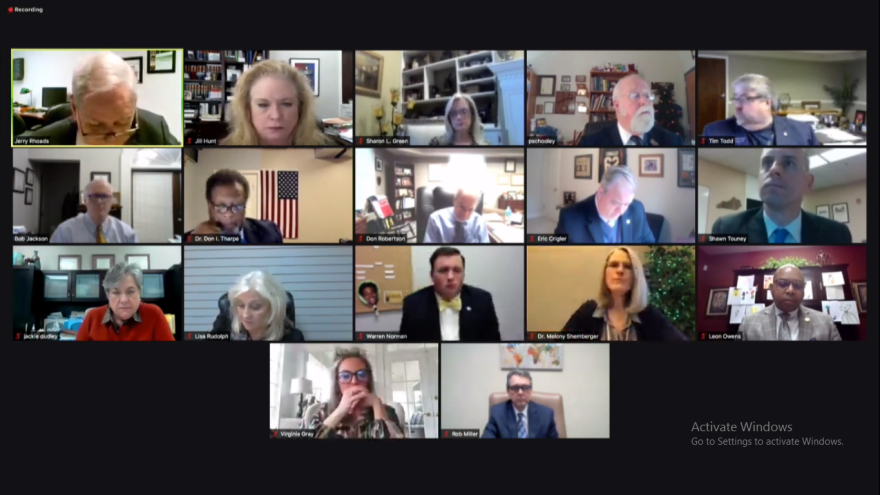With only four months left in the fiscal year, Murray State University’s administration is weighing a number of moving parts as it begins to craft the Fiscal Year 2022 budget, factoring a potential multi-million dollar hit to the university’s funds in the wake of the ongoing pandemic.
Vice President of Finance and Administrative Services Jackie Dudley reported to the MSU Board of Regents today her office has been able to calculate around $16 million in revenue losses since the pandemic began. That number includes the anticipated continued losses through the end of fiscal year 2021, which ends in June. She noted that number could be higher, her office anticipates there are also incalculable losses.
So far, Dudley said, the university has received--for the university’s purposes--around $12 million in federal stimulus funding.
“So right now, we’re sitting underfunded basically by $4 million,” she said. “Lost revenue is going to be the most important thing to recover.”
Dudley said the university was also awarded $6 million for redistribution directly to students, and $3.1 million was distributed to students last semester. She said the university will have to do it again this semester once the U.S. Department of Education passes down the compliance directions.
“We expect those every week, but we haven't gotten them yet as of this week,” she noted.

Dudley said learning the compliance guidance which dictates how the funds can be utilized will assist in creating the FY22 budget.
Another consideration she mentioned to the board is the stimulus funding wasn’t handed in lump sum to the university; the university incurs the expense and then files for reimbursement with the U.S. Department of Education. She said it “would be nice” if the department would issue the awarded funds in entirety to the university, but that’s not the way it works.
And while the university considers ways in which it might recover lost revenue, a Kentucky legislative bill threatens to increase expenses.
Government and Institutional Relations Director Jordan Smith reviewed a handful of pieces of legislation currently under review as part of the ongoing legislative session. The piece he spent the most time discussing is House Bill 8.
He explained the bill proposes a change in Kentucky Employee Retirement System (KERS) employer contribution rates for non hazardous employees, from total percentage of payroll to level dollar funding. For MSU, the change in the calculation would increase rates from the current 49.47% to 98.8%, which is about a $4 million increase per fiscal year.
“This change in the calculation of rates really creates a massive disparity among all of the public universities in Kentucky that are in KERS,” he said. “But also all of the quasi agencies, overall; health departments, mental health centers, agencies that really are on the front lines of this pandemic that can’t afford to be dealing with this sudden KERS rate increase.”
Smith said his office is working closely with regional legislators to share information and make suggestions. He said the bill passed the House and now awaits tweaks from the Senate and noted he believes the legislature “really wants to get it right.”
In other business:
MSU Chief Information Officer Brian Verkamp reported the university is in the process of upgrading internet service on campus. The projects are funded by a portion of the federal stimulus dollars awarded to the university, which may be used for technological advancements. He said the university has received complaints for some time from students trying to access wireless internet on the north and south ends of campus and increased remote learning resulted in a larger strain on the bandwidth. He said the university will move forward with expanding wireless connectivity campuswide and begin preparations and purchasing equipment for the fiber optic network expected to reach campus later this year as part of the Kentucky Wired project. He said the project will increase the university bandwidth from 10 gigs to 40 gigs. Some of the funds will also be used to replace the aging laptops available through Waterfield Library, as well as purchase an additional 15. He said some funds will also be left over for departments to specifically request based on their needs.
The board unanimously approved conducting the annual presidential evaluation electronically. The regents believe it will better preserve anonymity of respondents.
A virtual campus town hall meeting is scheduled for April 14 and will be open for the public to hear the university budget presentation for the upcoming fiscal year, and ask questions.
Director of Facilities Management Jason Youngblood reported the university has selected a contractor for the Lovett Auditorium upgrades and renovations. In addition to the original renovation plans, he said they’ve decided to also replace the seating. But, the original end panels currently in place will be salvaged and refurbished so parts of the original facility are preserved as part of the updated facility. He said the project should be completed by the end of Fall 2021 semester, and he hopes it will be ready to reopen by the holiday season or Spring 2022 semester.
Vice President for Student Affairs and Enrollment Management Dr. Don Robertson said his office has prioritized a focus on student mental health. He said nearly 200 faculty and staff members have signed up for an eight-hour course which will help them better identify students who may be in need of mental health services, and provide them with the information for available resources for those students. He said they’re also working on a peer mentoring program.





